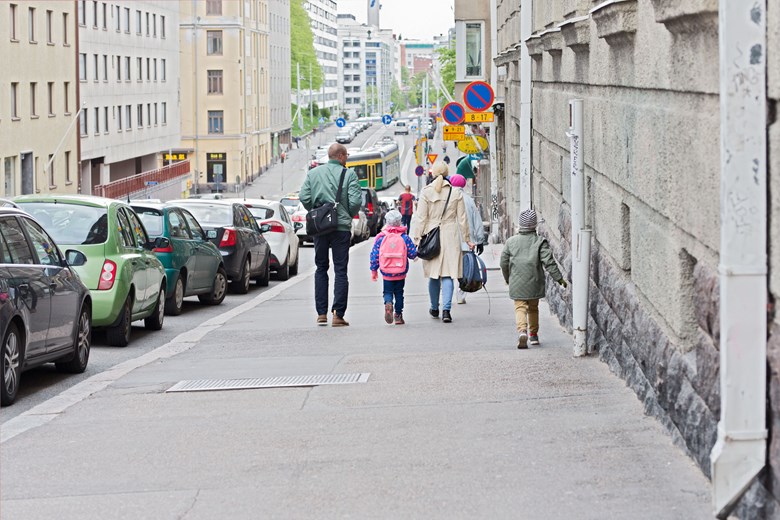How to reduce your exposure to air pollutants?

You are exposed to air pollutants both indoors and outdoors. The higher the pollutant concentrations in the air and the longer you breathe in polluted air, the higher the exposure to air pollutants. The location and indoor air quality of your home exert a decisive impact on your health. When you move house, you are also making an important decision about your exposure to air pollutants.
People living and moving about in city centres and other heavily trafficked areas are particularly exposed to air pollutants. Even just a block away from a main route, the air is cleaner, and your exposure to fine particles, for example, is reduced by approximately 25%. Smoke from wood burning in detached housing areas may also significantly increase exposure to air pollutants. A large portion of the gaseous and particle-like harmful substances in outdoor air is transported into building interiors.
Fine particles are the most harmful air pollutant for humans, and they are easily transported into indoor air. You are most exposed to pollutants at home, because that is where you spend the majority of the day. In contrast, momentary pollution spikes at a bus stop, for example, can cause symptoms immediately, but they have little impact on overall exposure.
The use of fireplaces generates smoke, i.e. emissions into the air. Especially if waste or wet wood is burned, a lot of particles, carbon monoxide and hydrocarbons are released into the air through the chimney. These are harmful to human health and also reduce comfort. You can influence how cleanly wood burns. It is all based on the quality and dryness of the firewood. Even an old fireplace can be used skilfully, reducing the amount of pollutants formed.
To reduce your exposure to air pollutants:
- Monitor the air quality of your residential area and the routes you use.
- Choose a cleaner route when on the move.
- Avoid outdoor activities along busy streets and routes, especially during rush hour.
- Avoid strenuous physical exertion in busy areas.
- If the quality of the outdoor air is poor, go somewhere with cleaner air, such as indoors.
- In frosty weather, you can warm up the air you breathe with a breathing air heater or scarf. This reduces the harmful combined effect of pollutants and cold air.
- Avoid ventilating your apartment through a window, especially during rush hours if it is located in a busy area.
- High-quality supply air filters for residences and cars effectively reduce the amount of dust that is breathed in. The filters should be maintained regularly.
- In cars, you can enable the recirculation mode of air conditioning in the dustiest areas.
- Use your fireplace skilfully.
When air quality deteriorates
- If you experience symptoms, treat them and use medication.
- Go somewhere with cleaner air, indoors, or further away from traffic.
- Avoid high-intensity exercise outdoors.
- Monitor how the situation develops.
If the air quality deteriorates sharply, we will inform residents without delay.
See also
Your choices affect the quality of breathing air
Transport
- Favour cycling, walking and public transport.
- Pick a low-emission car.
- Preheat the car engine when the temperature drops below +5°C.
- Avoid idling.
- If possible, drive outside rush hours and avoid congested areas.
- Observe an economical driving style.
- Use the recirculation mode of air conditioning in the car if driving in heavy traffic.
Street dust
- Move your car away from a street that is about to be cleaned.
- Use a proactive driving style and favour non-studded friction tyres.
- Change to summer tyres in good time.
- Avoid unnecessary driving.
- Use public transport. Cycle and walk.
- Use washed and sifted ground grit.
- Always remove sand when wet.
- Do not use a leaf blower for sand removal.
- If you do not take care of the yard yourself, use your influence in your housing company.
Wood burning
- Use dry and clean wood.
- Do not burn waste or recyclable material.
- Avoid burning wood with insufficient air. Good combustion requires sufficient air.
- Learn how the weather affects smoke behaviour.
- Consider the wind direction before lighting a fire to avoid smoking out your neighbours.